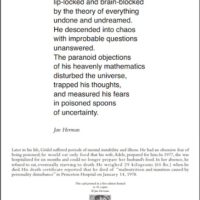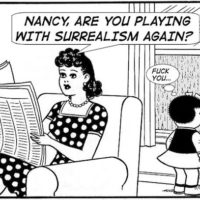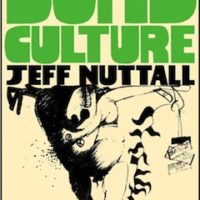Home again. / They were / her last words. / She never / had a home. / She slept in ditches / under bridges / near old / railroad tracks. . . .
Nelson Algren’s Strange Midnight Dignity
In straightforward yet graceful prose and with deep insight—let alone an immense amount of meticulous research—Colin Asher has produced a major literary biography. “Never A Lovely So Real’ testifies to the richness of Algren’s genius as a writer and explains the misunderstood nature of the man. It reveals what made him tick, exposes the legends, and brings him to life in a way no previous biography has. It certainly changed my perception of him. And if there’s any justice, it will put Algren’s books back into the heart of the 20th-century American canon.
‘Flesh Film’: A Book as Artist’s Fever Dream
When a book reads like an hallucination and looks as magnificent as Flesh Film, it’s an artist’s book as much as a writer’s. The designer Robert Schalinski has given the author’s text the appearance of a manuscript duplicated on an old copying machine and punctuated it with the author’s visual collages. It’s gorgeous stuff, published in English by the German publisher Moloko Print, and it’s available for the first time in the U.S. from printedmatter.org.
Variation on a ‘Clap Trap’ Theme
Personally, I prefer Brion Gysin’s versified lines: “In the beginning / was the Word— / been in You / for a toolong time /I rub out the word . . .” But unlike that one, this one was made to order.
Butterworth’s Post-Atomic Wasteland
Michael Butterworth started writing short fiction in 1966 for the British science-fiction magazine New Worlds when its editor was Michael Moorcock. He was one of the younger exponents of that New Wave of science fiction, as the movement became known, and he continued contributing to New Worlds until the editions most closely associated with Moorcock came to an end in 1979. Now he has two new books out that collect the fiction of those early years which he had thought “lost for good.”
Power Malu Shines at 2019 Ackers
The honorees at the 2019 NY Acker Awards made some terrific statements about the history of the Lower East Side and their commitment both to the community and to the arts, but a rap performance by Power Malu about the devastation in Puerto Rico, where people are still struggling to recover from Hurricane Maria and from the Trumpistan government’s failure to provide proper help, was the most notable of the evening.
‘Prisoner: Come Out!’
“In the beginning was the Word—been in You for a toolong time.I rub out the word. You in the Word and the Word in You is a word-lock like the combination of a vault or a valise. If you love your vaults, listen no further. I spin the lock on your Interior Space Kit. Prisoner: Come Out!” — Brion Gysin
City Lights: The Little Bookshop That Could
As San Francisco prepares to celebrate Lawrence Ferlinghetti’s 100th birthday on Sunday, City Lights Books will be the focus of much attention. The little paperback bookshop he launched in 1953 is now so large that it occupies an entire block of storefronts and doubles as a North Beach tourist attraction. This is what the storefront […]
2019 NY Acker Awards Held at Theater for the New City
The Acker Awards, now in their sixth year, are a tribute given to members of the avant-garde arts community who have made outstanding contributions in their discipline in defiance of convention, or else served their fellow writers and artists in outstanding ways. The award’s novelist namesake, in her life and work, exemplified the risk-taking and […]
Ferlinghetti: ‘Pity the Nation Whose Leaders Are Liars’
Lawrence Ferlinghetti must be wondering what all the fuss is about. After all, he’s only going to turn 100 on Sunday. What’s the big deal? I’m betting he would prefer that people take note of his twelve-year-old poem: “Pity the nation whose people are sheep . . .”
Patchel’s ‘Plinkout’
Keith Patchel, a New York-based composer and producer, has created a free online/mobile application called Plinkout, which he is touting as “the easiest way to teach anyone,” especially kids, how to play an instrument as well as how to learn “the core cognitive ideas of music.” He’s looking for funding to complete his project, and […]
A Silent Elegy in Motion
Have a look at this collective headstone for “the 1,337 journalists killed in the line of duty since 1992.” Watch their names coalesce on screen into the image you see here. It is a silent elegy in motion that makes it pure poetry.
Cold Turkey Press: ‘Ikkyū Sojun Nine Poems’
The Rinzai Zen master Ikkyū Sojun (1394-1481) was a poet, musician, artist, and rebel. He led a life of whoring and drinking. “Sex became a transcendental and sacred act,” Malcolm Ritchie writes in an afterword to this chapbook. Ikkyū’s poems —”often erotic, argumentative, contradictory, judgmental, self-doubting, and occasionally shaded with guilt”—are still as startling as the day they were written.
Shulman’s ‘Age of Disenchantments’ Has Arrived
Aaron Shulman’s collective biography of the Spanish Panero family, The Age of Disenchanments—just out from Ecco— has a cast of dramatic characters that is nothing less than stunning. “No one’s ever told their story in English, and only in fragments in Spanish,” Shulman says.
Nancy & Sluggo Get Twisted
In a world where the difference between appropriation and exploitation can be hard to figure, Gary Lee-Nova’s devotion to the cartoonist Ernie Bushmiller makes all the difference. “I’m beyond being in love with his work,” says the author of these panels. “Although he passed in 1982, I feel like I’m collaborating with him.”
From ‘The White Poems’
‘This emptiness is my private lair. / It confines me like a clubman’s chair. / I am free of desire. / I don’t mind being here either.
Bombing the Culture
‘Culture, being the broad effect of art, is rotundly irrational and as such is perpetually operating against the economic workaday structure of society. The economic structure works towards stasis centered around static needs. It is centripetal. Culture forces change centered around changing appetites. It is centrifugal.’ — Jeff Nuttall

















